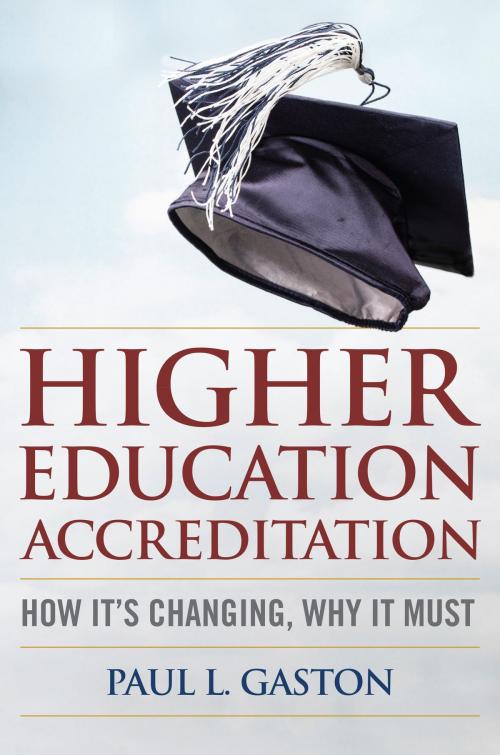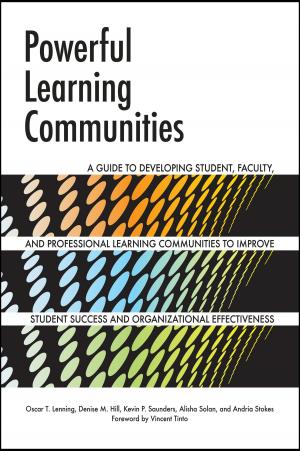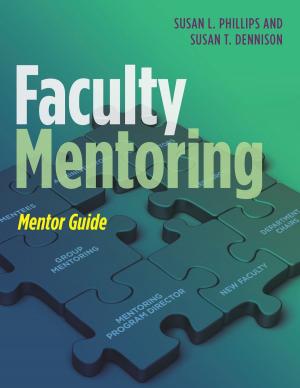Higher Education Accreditation
How It's Changing, Why It Must
Nonfiction, Reference & Language, Education & Teaching, Higher Education| Author: | Paul L. Gaston | ISBN: | 9781579227654 |
| Publisher: | Stylus Publishing | Publication: | December 6, 2013 |
| Imprint: | Stylus Publishing | Language: | English |
| Author: | Paul L. Gaston |
| ISBN: | 9781579227654 |
| Publisher: | Stylus Publishing |
| Publication: | December 6, 2013 |
| Imprint: | Stylus Publishing |
| Language: | English |
“Paul Gaston has crafted a balanced, thoughtful explanation of accreditation. With higher education changing faster than it has at any period in its history, Gaston’s book is a must-read to understand the sea change impacting higher education and how accreditation can impact our future."—Robert G. Frank, President, The University of New Mexico
“There is a remarkable lack of awareness of the considerable work of the past twenty-five years in assessment of learning, in shifting to student-centered pedagogies, in explicit formulation of learning outcomes, and in developing continuous improvement processes in higher education. Paul Gaston is absolutely right that higher education needs to articulate a shared vision of our work and its significance for the nation. Without such a vision, the issues will be framed by others who are less well-informed, and the policy consequences will be—and have been—unfortunate. Paul Gaston’s thoughtful book gives us a balanced assessment of American higher-education accreditation and recommends a measured set of reforms to meet the challenges of this new era.”—Eduardo M. Ochoa, President, California State University, Monterey Bay, and former U.S. Assistant Secretary for Postsecondary Education
Is the accreditation system “broken” as claimed by successive Secretaries of Education and some recent reports?
This book addresses this question head-on, asking whether accreditation is indeed in need of radical reform, and whether the agencies’ authority should be curtailed; or whether in fact the changes now underway – that accrediting agencies contend ensure rigorous and consistent standards and degrees that are a reliable gauge of student attainment – are moving the academy and the nation in the right direction.
In a sweeping and ambitious book, Paul Gaston deploys his knowledge and experience as a peer reviewer for three regional accrediting agencies, a former board member and chair of the Association of Specialized and Professional Accreditors, and his involvement in the early stages of the Council for Higher Education Accreditation, to go beyond the polemics to explore whether a strategy that builds on the emerging values and good practices can achieve the substantive and positive improvements the public is demanding.
He undertakes a dispassionate analysis of the arguments and recommendations of critics and supporters of the current direction of accreditation to identify common ground and explore constructive ways forward, paying specific attention to current and potential reforms of the three sectors of higher education accreditation: the seven regional accrediting associations, the national accreditors, and programmatic, or “specialized” accreditation.
Heconcludes by outlining a comprehensive approach to reform that would result in a higher education accreditation structure more cost effective, more efficient, more transparent and accountable, and more responsive to institutional and public needs.
“There is a remarkable lack of awareness of the considerable work of the past twenty-five years in assessment of learning, in shifting to student-centered pedagogies, in explicit formulation of learning outcomes, and in developing continuous improvement processes in higher education. Paul Gaston is absolutely right that higher education needs to articulate a shared vision of our work and its significance for the nation. Without such a vision, the issues will be framed by others who are less well-informed, and the policy consequences will be—and have been—unfortunate. Paul Gaston’s thoughtful book gives us a balanced assessment of American higher-education accreditation and recommends a measured set of reforms to meet the challenges of this new era.”—Eduardo M. Ochoa, President, California State University, Monterey Bay, and former U.S. Assistant Secretary for Postsecondary Education
Is the accreditation system “broken” as claimed by successive Secretaries of Education and some recent reports?
This book addresses this question head-on, asking whether accreditation is indeed in need of radical reform, and whether the agencies’ authority should be curtailed; or whether in fact the changes now underway – that accrediting agencies contend ensure rigorous and consistent standards and degrees that are a reliable gauge of student attainment – are moving the academy and the nation in the right direction.
In a sweeping and ambitious book, Paul Gaston deploys his knowledge and experience as a peer reviewer for three regional accrediting agencies, a former board member and chair of the Association of Specialized and Professional Accreditors, and his involvement in the early stages of the Council for Higher Education Accreditation, to go beyond the polemics to explore whether a strategy that builds on the emerging values and good practices can achieve the substantive and positive improvements the public is demanding.
He undertakes a dispassionate analysis of the arguments and recommendations of critics and supporters of the current direction of accreditation to identify common ground and explore constructive ways forward, paying specific attention to current and potential reforms of the three sectors of higher education accreditation: the seven regional accrediting associations, the national accreditors, and programmatic, or “specialized” accreditation.
Heconcludes by outlining a comprehensive approach to reform that would result in a higher education accreditation structure more cost effective, more efficient, more transparent and accountable, and more responsive to institutional and public needs.
“Paul Gaston has crafted a balanced, thoughtful explanation of accreditation. With higher education changing faster than it has at any period in its history, Gaston’s book is a must-read to understand the sea change impacting higher education and how accreditation can impact our future."—Robert G. Frank, President, The University of New Mexico
“There is a remarkable lack of awareness of the considerable work of the past twenty-five years in assessment of learning, in shifting to student-centered pedagogies, in explicit formulation of learning outcomes, and in developing continuous improvement processes in higher education. Paul Gaston is absolutely right that higher education needs to articulate a shared vision of our work and its significance for the nation. Without such a vision, the issues will be framed by others who are less well-informed, and the policy consequences will be—and have been—unfortunate. Paul Gaston’s thoughtful book gives us a balanced assessment of American higher-education accreditation and recommends a measured set of reforms to meet the challenges of this new era.”—Eduardo M. Ochoa, President, California State University, Monterey Bay, and former U.S. Assistant Secretary for Postsecondary Education
Is the accreditation system “broken” as claimed by successive Secretaries of Education and some recent reports?
This book addresses this question head-on, asking whether accreditation is indeed in need of radical reform, and whether the agencies’ authority should be curtailed; or whether in fact the changes now underway – that accrediting agencies contend ensure rigorous and consistent standards and degrees that are a reliable gauge of student attainment – are moving the academy and the nation in the right direction.
In a sweeping and ambitious book, Paul Gaston deploys his knowledge and experience as a peer reviewer for three regional accrediting agencies, a former board member and chair of the Association of Specialized and Professional Accreditors, and his involvement in the early stages of the Council for Higher Education Accreditation, to go beyond the polemics to explore whether a strategy that builds on the emerging values and good practices can achieve the substantive and positive improvements the public is demanding.
He undertakes a dispassionate analysis of the arguments and recommendations of critics and supporters of the current direction of accreditation to identify common ground and explore constructive ways forward, paying specific attention to current and potential reforms of the three sectors of higher education accreditation: the seven regional accrediting associations, the national accreditors, and programmatic, or “specialized” accreditation.
Heconcludes by outlining a comprehensive approach to reform that would result in a higher education accreditation structure more cost effective, more efficient, more transparent and accountable, and more responsive to institutional and public needs.
“There is a remarkable lack of awareness of the considerable work of the past twenty-five years in assessment of learning, in shifting to student-centered pedagogies, in explicit formulation of learning outcomes, and in developing continuous improvement processes in higher education. Paul Gaston is absolutely right that higher education needs to articulate a shared vision of our work and its significance for the nation. Without such a vision, the issues will be framed by others who are less well-informed, and the policy consequences will be—and have been—unfortunate. Paul Gaston’s thoughtful book gives us a balanced assessment of American higher-education accreditation and recommends a measured set of reforms to meet the challenges of this new era.”—Eduardo M. Ochoa, President, California State University, Monterey Bay, and former U.S. Assistant Secretary for Postsecondary Education
Is the accreditation system “broken” as claimed by successive Secretaries of Education and some recent reports?
This book addresses this question head-on, asking whether accreditation is indeed in need of radical reform, and whether the agencies’ authority should be curtailed; or whether in fact the changes now underway – that accrediting agencies contend ensure rigorous and consistent standards and degrees that are a reliable gauge of student attainment – are moving the academy and the nation in the right direction.
In a sweeping and ambitious book, Paul Gaston deploys his knowledge and experience as a peer reviewer for three regional accrediting agencies, a former board member and chair of the Association of Specialized and Professional Accreditors, and his involvement in the early stages of the Council for Higher Education Accreditation, to go beyond the polemics to explore whether a strategy that builds on the emerging values and good practices can achieve the substantive and positive improvements the public is demanding.
He undertakes a dispassionate analysis of the arguments and recommendations of critics and supporters of the current direction of accreditation to identify common ground and explore constructive ways forward, paying specific attention to current and potential reforms of the three sectors of higher education accreditation: the seven regional accrediting associations, the national accreditors, and programmatic, or “specialized” accreditation.
Heconcludes by outlining a comprehensive approach to reform that would result in a higher education accreditation structure more cost effective, more efficient, more transparent and accountable, and more responsive to institutional and public needs.















